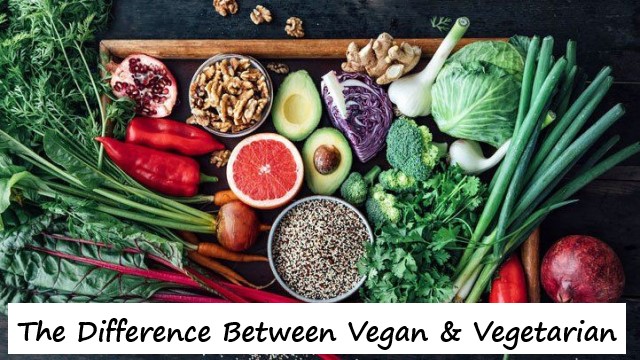The Difference Between Vegan & Vegetarian – Switching up your diet to cut out meat can be a challenge, but it can also be a great way to get healthier, save money and do your bit for the environment.
If you’re thinking about cutting out meat, you might also be thinking about cutting out animal products like milk and eggs. Generally, a diet excluding meat is labelled as vegetarian, while a diet excluding all animal products is labelled as vegan.
Read on to find out more in this website https://thevegangarden.com/ about the differences, and to prepare for your new diet.

What is a vegetarian?
A vegetarian is someone who doesn’t eat any meat, fish, or meat products like gelatine. Vegetarians still eat animal products like milk, cheese, butter and eggs.
It’s not hard to get all the essential vitamins and minerals you need on a vegetarian diet, but if you’re switching over from eating meat for the first time, it’s important to do some meal prep. You’ll probably need to bulk out your diet with vegetarian sources of protein like pulses.
This page from the NHS gives a detailed guide on what should be included in a vegetarian diet.
Type of Vegetarian
Lacto-vegetarian
A lacto-vegetarian is a vegetarian who doesn’t eat any eggs, but does eat dairy products like milk, butter, cheese, cream and yoghurt.
An ovo-vegetarian is a vegetarian who doesn’t eat any dairy products, but does eat eggs.
Lacto-ovo-vegetarian
The most common type of vegetarian is lacto-ovo. This is where you eat eggs and dairy products. Eating this type of diet is a good way to make sure you’re still getting plenty of protein and key minerals like calcium and vitamin D.
A pescatarian is someone who eats fish and other seafood, as well as dairy and eggs. Pescatarians don’t eat red meat, game or poultry, but they’re not classed as vegetarians because they still eat fish. If you’re looking to make the move to vegetarianism, you can start out by trying a pescatarian diet.
The good thing about a pescatarian diet is that it can incorporate oily fish like salmon and mackerel, which are rich in essential nutrients. The NHS recommends eating two portions of fish each week, one of which is oily.
What is a vegan?
A vegan is a someone who doesn’t eat any animal products, including:
- Red meat
- Poultry
- Game
- Fish and seafood
- Eggs
- Milk, cheese, butter and yoghurt
- Meat products like gelatine
According to The Vegan Society, a vegan diet should also exclude honey, materials derived from animal (e.g. leather), and products that are tested on animals.
Benefits of a vegan diet
Switching to a vegan diet can have lots of benefits. If you’re worried about animal cruelty or the environmental issues associated with farming, veganism is a great way to reduce your meat consumption.
On a health front, veganism is a good way to be more mindful about what you eat, simply because it requires more preparation. A vegan diet also tends to be lower in saturated fats (often found in animal products) and include more fruit & veg.
If you eat a lot of meat and you’re trying to lose weight, changing to veganism might be a good option. Read this article to learn more about veganism and weight loss.
Do vegans need supplements?
Cutting out animal products can make it harder to get protein and essential nutrients like vitamin B12, iron and calcium. If you’re keen to make the switch, try to plan a diet that’s balanced and varied, and includes key, nutrient-rich foods. Find out how you can get enough protein on a vegan diet with our vegan protein sources article.
Vegans who struggle to get all the nutrients they need might need to take supplements. Find out more by reading this article.
Typical vegan diet
A vegan diet should be balanced and varied, and include:
- Five portions of fruit and vegetables each day
- Starchy carbohydrates like potatoes, wholegrain bread, and brown rice and pasta
- Dairy alternatives like soya and nut milks
- Beans, pulses and other protein sources
You can get detailed help with planning your vegan diet by checking out the Vegan Eatwell Guide from the The Vegan Society.
Why not try Veganuary?
January can be a great time to make a change to your diet. If you’re looking to shake things up, why not spend January eating vegan food as part of Veganuary? The idea is to cut all animal products from your diet until the end of the month.
Remember, even a partial change is a good start. If you’re not ready to make the change all in one go, try eating two or three vegetarian or vegan meals a week. You can work up from there!